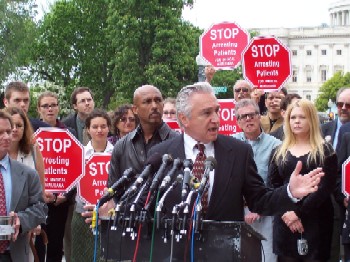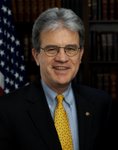The Canadian House of Commons voted Monday to adopt US-style mandatory minimum sentences for drug offenses, including small-time marijuana grows. The only chance to defeat the measure now lies with the Canadian Senate, an unelected body not generally known for second-guessing the House.
The Obama administration used an Albuquerque press conference to unveil and tout its latest proposals for dealing with Mexico's drug trafficking organizations and the prohibition-related violence around them, but is it anything other than more of the same old same old?
These days, the treasure of the Sierra Madre isn't gold, but pot and opium. And nobody down there seems to feel like they need any stinking badges, not even the cops. In "God's Middle Finger," journalist Richard Grant takes a wild trip through the cordillera. Tired of dry old books about drug policy? Try this one for a change of pace.
It never ends. Another week of greedy jail guards and thieving policemen. This whole cops robbing drug dealers thing is getting kind of old, too.
At the request of Rep. Maurice Hinchey (D-NY), the House Appropriations Committee has added language to the Justice Department appropriations bill asking the Obama administration to clarify its stance on DEA raids on medical marijuana providers in states where it is legal.
In a hangover from the Clinton and Bush administrations' war against medical marijuana, California dispensary operator Charles Lynch was sentenced to a year and a day in prison Thursday. That was well below the mandatory minimum five-year sentence required by federal law, and Lynch remains free on appeal, but advocates say he should not have been punished at all.
Rhode Island is about to become the third medical marijuana state to authorize its distribution through dispensaries after a bill passed both houses with veto-proof majorities.
Drug overdoses -- both licit and illicit -- are the second leading cause of accidental death for adults in the US. Now, a member of Congress wants to do something about it, and the Drug Policy Alliance has some ideas.
In a bid to deal with the state's gargantuan budget deficit, California Gov. Arnold Schwarzenegger wants to cut funding for HIV/AIDS programs and Proposition 36 treatment programs. Protests over the former broke out this past week in cities across the state.
More than a quarter of American adults polled in a recent survey don't think simple drug possessors need to go to jail. That's a start.
As the Senate debated the FDA tobacco regulation bill it approved yesterday, one Republican senator called his colleagues hypocrites and urged them to support an outright ban. Was it just posturing?
The killing of Tarika Wilson, an unarmed mother holding her child, and the maiming of that child, is an inevitable consequences of the overuse of SWAT teams and the growing paramilitarization of the drug war.
Events and quotes of note from this week's drug policy events of years past.
"Charlie Lynch Sentenced to Jail for Medical Marijuana," "Rhode Island Senate Votes to Open Medical Marijuana Dispensaries," "Wrong Door Drug Raids Are No Laughing Matter," "Congress Calls on DOJ to Better Explain Medical Marijuana Policy," "No More $$$ = No More Prisons," "Khat Is a Harmless Plant. So Why is DC Trying to Prohibit It?," "Holder Renews Pledge to Respect Medical Marijuana Laws," "Drug War Robots Are Not the Answer," "Bad Cops Caught on Camera," "Canadian House Passes Anti-Crime Bill with Mandatory Minimums for Pot, Other Drug Offenses."
Apply for an internship at DRCNet and you could spend a semester fighting the good fight!
Bowing to the wishes of Canadian Prime Minister Stephen Harper, Liberal Party Members of Parliament (MPs) joined Monday with Harper's Conservatives to pass the controversial C-15 mandatory minimum sentencing drug offense bill. The bill was opposed by MPs of the New Democratic Party (NDP) and the Bloc Québécois.

C-15 hearings online video collection
Monday's vote came only after NDP and Bloc MPs filibustered the bill last week. But when one NDP member could not make it to parliament, the filibuster collapsed, and the Liberal Party leadership joined with the Conservatives in forcing a successful vote.
It also came after committee hearings on C-15 in which 13 of 16 witnesses, including criminal justice, health, and harm reduction experts, testified against the bill. Among them was US Criminal Justice Policy Foundation head Eric Sterling, who drafted mandatory minimum legislation for Congress as House Judiciary Committee counsel in the 1980s and saw the flawed politics firsthand.
The bill next goes to the Canadian Senate. Unlike the US, Canadian senators are appointed, not elected, and the Canadian Senate typically -- but not always -- defers to the House. Observers hold out some hope that in this case, the Senate, which called for the legalization of marijuana in a 2002 report, will seek to block or amend the bill. The Senate could also effectively kill the bill by refusing to act on it before new elections are called.
Under the measure, mandatory minimum sentences would be enacted for a number of drug offenses, including an automatic six-month jail term for growing as few as five marijuana plants. Growing more than five plants would earn a mandatory minimum two-year sentence, and mandatory minimum sentences would also be in effect for other drugs, such as cocaine and methamphetamine.
The tough sentences are aimed at "serious drug traffickers, the people who are basically out to destroy our society," said Justice Minister Rob Nicholson in the run-up to passage of the bill. But critics charged the bill would end up targeting low-level first offenders and filling Canada's prisons with them.
"I think it is really bad news," MP Libby Davies (NDP-Vancouver East) told Vancouver's Cannabis Culture magazine. "The evidence shows very, very strongly -- overwhelmingly -- that mandatory minimum sentencing is not an effective policy when it comes to drug crime. My fear is that we are going to see more people in jail, and more people fighting charges because they know they will be facing a mandatory minimum sentence. That means more court time and more backlogs."
"Mid and upper-level traffickers will get no particular increase in punishment, because a major dealer would already get six months or a year for any kind of trafficking," said Vancouver marijuana activist and Cannabis Culture publisher Marc Emery. "What we're going to see is people who wouldn't normally go to jail, they're going to be the people affected. It's going to be largely young people in schoolyards -- because if you are dealing around a school, it's an enhanced penalty. The enhanced penalties of six months, a year, two years, are going to affect, almost exclusively, people under the age of 25."
"The criminal justice approach has not only failed to achieve its initial goal of lowering drug use and availability, it has exacerbated the problem," said Jacob Hunter, policy director of the newly formed Beyond Prohibition Foundation. "The committee was presented with more than 50 scientific studies that stated this unequivocally, but the Conservative Party ignored that evidence, talking instead about the victims of crime. It is obvious from the evidence that C-15 will increase the violence and crime on our streets, almost exclusively target low-level and addicted dealers, and do so at great cost to families and taxpayers. Instead of repeating the costly mistakes of the past, we ought to go in a new direction."
Liberal Party opposition could have blocked the bill, but the party instead supported it for political reasons, said Hunter. "The Liberals are afraid of losing votes in suburban and rural ridings and don't know how to counter accusations of being 'soft on crime,'" he said. "Most Liberals are aware of the evidence on C-15, and indeed there was apparently lively disagreement in caucus over support for the bill, but ultimately, the Liberal leadership opted to support the bill."
Hunter was hopeful, but not optimistic, that the Senate would act to block passage of C-15. "It's tough to know what will happen, with many Senators vowing to fight this bill as long as it takes, the Senate has rarely blocked a bill passed by the House of Commons," he said.
But at this point, decisive action -- or inaction -- in the Senate is all that stands between Canada and the embrace of mandatory minimum sentencing for drug offenses. Too bad Canada's Conservatives, who are playing from an outdated US playbook, refuse to learn the lessons of the failures of such policies south of the border. And too bad the Liberals are so craven and cowed that they know better, but vote for such measures for the sake of political expediency.
back to top
The Obama administration last Friday unveiled its Southwest Border Counternarcotics Strategy to deal with the unremitting prohibition-related violence plaguing Mexico, and especially its border cities. Since Mexican President Felipe Calderon enlisted the military in his offensive against the so-called cartels in December 2006, some 11,000 people have died in the violence, and the streets of Mexican border towns have at times resembled battlefields.

US Border Patrol
In recognition of the continuing violence and heedful of Mexican criticism that the US is not doing enough on its end to undercut the cartels, the administration responded first with increased funding for border law enforcement in March and now with the new counternarcotics strategy. The new strategy will emphasize reducing demand in the US and targeting the flow of money and weapons south. It includes:
- Building visual shields near border-crossing points so drug cartel spotters can't alert approaching motorists about inspections.
- Improving non-lethal weapons technology to help officers incapacitate suspects and disable motor vehicles and boats used by traffickers.
- Reviving an interagency working group to coordinate intelligence.
- Using more intelligence analysts to uncover drug-dealing networks.
- Helping Mexico bolster its judicial system through training in the United States.
- Focusing on combating corruption among US law enforcement and elected officials.
- Delivering an additional $60 million to border law enforcement agencies.
"This new plan, combined with the dedicated efforts of the government of Mexico, creates a unique opportunity to make real headway on the drug threat," said Gil Kerlikowske, head of the Office of National Drug Control Policy (ONDCP), at an Albuquerque press conference unveiling the new strategy.
"International cooperation is very, very key," said Homeland Security Secretary Janet Napolitano, taking time to praise Calderon for his efforts. "We have an unprecedented opportunity to work on drug trafficking on both sides of the border," she said. "We should not let this opportunity go by."
According to the Justice Department, Mexican and other South American drug trafficking organizations are laundering between $18 billion and $39 billion a year in drug profits in the US. Some of that money then goes to purchase weapons in the lightly-controlled US gun market. Traffickers use those weapons against each other, as well as Mexican police and soldiers, as evidenced dramatically last weekend in the Acapulco shootout that left 18 people dead, including two soldiers, and the killings of 13 people in Ciudad Juarez last Friday despite the presence of more than 5,000 soldiers patrolling the city.
Reducing demand in the US is a key part of the struggle, said Napolitano. "We can't just fight drugs at the border. We can't just fight drugs by fighting traffickers. We must fight drugs in the United States," Napolitano said.
"This strategy is tough, it's strong, and it's balanced," said Attorney General Eric Holder, adding that it will be "an effective way forward that will crack down on cartels and make our country safer."

cross-border smuggling tunnel
Others weren't so sure that would be the case. "The new plan simply calls for rearranging deck chairs on the Titanic," said Aaron Houston, director of government relations for the
Marijuana Policy Project. "The plan ignores the central problem, which is that our policy of marijuana prohibition has handed the Mexican cartels a massive market that keeps them rolling in cash, not just in Mexico, but according to the Department of Justice, in 230 American cities."
"Rather than trying to make America's 15 million monthly marijuana consumers go away, we need to gain control of this market by regulating marijuana like we do beer, wine and liquor," Houston continued. "Any anti-drug effort that leaves the marijuana trade in the hands of the cartels is nothing but a full-employment plan for professional drug warriors and cartel bosses alike, not a serious proposal to address the problem," he said.
The Drug Policy Alliance (DPA) was a bit more diplomatic. "The violence on the US and Mexico border is spiraling out of control because of the Mexican drug war. We are hopeful that Obama's new strategy will bring real change, and not more of the same policies that are failing our nation and communities," said Julie Roberts, acting director of Drug Policy Alliance New Mexico. "It is disappointing that our federal officials today remained focused on targeting the supply side of the Mexican drug war. Of course we need solutions that improve public safety and keep our country safe, but we also need to develop a public health plan for safely reducing drug demand in this country."
"The time has surely come to give serious consideration to taxing and regulating marijuana like alcohol," added DPA executive director Ethan Nadelmann. "That wouldn't solve all of Mexico's and America's prohibition-related problems, but it would prove invaluable in breaking the taboo on open debate and honest policy analysis, without which there can be no long term solutions to today's challenges."
While the criticism from drug reformers was blunt, some Latin Americanists had a more nuanced response. "This is the Obama administration's response to Mexico's criticism about the US not doing enough on arms trafficking, money laundering, and drug consumption," said Maureen Meyer of the Washington Office on Latin America. "The idea of enhanced cooperation among the different US agencies involved is an important step forward, and enhanced cooperation with Mexico is also important."
But while the administration is talking a good game, said Meyer, a look at the federal drug budget reveals a drug policy on cruise control. "The ONDCP drug control budget is a continuation of the same focus in US drug policy, with its objectives focusing a lot on interdiction and law enforcement, and not so much on arms trafficking. There is a slight increase in funding for treatment programs, but a reduction in funding for prevention. I don't see any shift in the balance," she said.
"When it comes to Mexico, what we need to see is a larger focus on some of the structural issues, such as reforming the police and the judicial system," Meyer said. "That is going to have more of a long-term impact than just providing more equipment for the police and the military."
For Larry Birns, executive director of the Council on Hemispheric Affairs, the new strategy appeared mostly symbolic. "I think the announcement of this strategy is way to put drug issues on the back burner for awhile while the administration deals with more pressing issues, like health care," he said. "The administration is trying to inoculate itself from criticism rather than undertaking an effort to effectively deal with drugs, which would involve the thornier border issues of immigration reform and the NAFTA traffic."
The border is a complicated place, affected not only by the drug trade but by licit trade, human migration, and weapons, among other issues. The drug trade in turn is driven by demand. Unfortunately, the Obama administration's Southwest Border Counternarcotics Strategy is largely more of the same old drug war, the critics suggest. Perhaps all the other issues would be better dealt without that drug war.
back to top
"God's Middle Finger" is not a book about drug policy. It's not really even a book about drugs; it belongs to the travel literature genre. But if you're interested in drugs, drug production, and drug policy, especially when it comes to the Mexican drug trade, this is a book you'll want to read.
And when you get done, you'll thank me, because this book is a real treat. Written by footloose British journalist Richard Grant, who came to this hemisphere in search of strangeness (his earlier book, "American Nomads," focused on drop-outs, hobos, and other oddities north of the border), "God's Middle Finger" is the sprawling, appalling, and sometimes frightening tale of his abortive quest to travel the length of Mexico's Sierra Madre mountain chain, a historically lawless and violent place where the presence of the Mexican state is only barely and rarely felt.
If you stand on the US-Mexican border at someplace like Douglas, Arizona, or Columbus, New Mexico, you can see the northern end of the Sierra Madre just a few miles to the south. From there, the massive, rugged range -- with peaks up to 11,000 feet -- extends nearly 900 miles to the south, cutting through the Mexican states of Chihuahua, Sonora, Nayarit, Sinaloa, and Durango in a series of massifs carved by spectacular and not easily traversable canyons. Historically the home of outlaws, hermits, cowboys, and renegade Indians (surviving bands of Apache were hiding out there as late as the 1930s, Grant reports), the contemporary Sierra Madre is now the haunt of outcasts, cave-dwelling Tarahumara Indians, Mormons, opium growers, pot farmers, vicious narcos, and -- every once in awhile -- marauding Mexican soldiers and police.
These days, the treasure of the Sierra Madre isn't gold, but the drug crops that grow there, and nobody needs any stinking badges. Or, even if they're wearing badges, it doesn't seem to make much difference. In one tale, Grant relates an evening in a bar in a mountain town where two lip-twitching, beer-swilling local cops insist he buy them caguamas (40 ouncers) of beer and share their cocaine, or perico (parakeet, because it makes you chatter like one). "Call me paranoid," Grant wrote, "but the idea of doing cocaine with Mexican cops makes me nervous." But given the alternative -- pissing off a pair of coked-out, half-drunk cops who would be mightily insulted in he turned down their offer -- Grant joined them in snorting lines off the table until, luckily for him, his money ran out and he could make his escape.
(I had a similar experience with a coke-shooting cop in a small town in Veracruz back in the mid-1990s. It was at that point that I began to understand that some of the cocaine diverted from the Caribbean smuggling route after a Reaganite crackdown in the mid-1980s and now flowing north through Mexico was "falling off the back of the truck." You didn't used to see a whole lot of cocaine in Mexico, and you certainly didn't run into coked-out cops. My, how things have changed!)
Grant writes that he was warned repeatedly not to travel the Sierra Madre, that he was likely to be killed if he traveled by himself. But, obsessed by those mountains, he went anyway, usually relying on local contacts to keep him safe. It didn't always work. The prologue to "God's Middle Finger" has him fleeing for his life on foot through the mountains at night, chased by drunken, coked-out narcos apparently ready to kill him for the sport of it. On another occasion, Grant tells about how he ruined his vehicle's motor after being forced at gunpoint to tow the broken-down car of some strangers up a mountain pass.
Grant has a great flair for story-telling and introduces the reader to a whole ensemble of vivid characters and local histories, but his love for the Sierra Madre curdles a bit when faced with the violent, rapacious realities of the lawless life. Private gun ownership is forbidden in Mexico, but as one of his informants tells him, every home has at least a shot gun and a pistol, and AK-47s are a badge of macho honor. Murder is common in the region, so is rape, and so is revenge killing. Mix in a hyper-violent population of narcos hopped up on blow and booze, and the stark beauty of the Sierra Madre gets pretty damned ugly and scary.
As Grant puts it: "What you had, in other words, was a hillbilly vendetta culture that was up to its eyeballs in the world's most dangerous business: illegal narcotics. Its existing tendencies toward violence, vengeance, and ruthlessness had become supercharged."
So supercharged that Grant, sick of the fear and tension and the macho posturing, cut short his trip about half-way down the cordillera. Prudence and revulsion may have won out over obsession, but with "God's Middle Finger," Grant provides a highly memorable set of glimpses into the mountain heartlands of some of Mexico's meanest narcos.
"God's Middle Finger" is fast-paced, full of intriguing detail and strange doings. Reading it is going to make you want to follow in Grant's footsteps... or run just as fast as you can in the other direction. In either case, you'll have had a fascinating education into a strange but not so distant world inextricably linked to our own through our appetites for some of the products it produces.
back to top
It never ends. Another week of greedy jail guards and thieving policemen. This whole cops robbing drug dealers thing is getting kind of old, too. But let's get to it:
In Carlisle, Indiana, a Wabash Valley Correctional Facility guard was arrested June 4 as he attempted to go to work carrying marijuana, cell phones and chargers, tobacco, and a video game player. Guard James Sheerin, 25, faces drug trafficking and possession charges. When investigators searched his car after his arrest, they also found cocaine, heroin, and more cell phones. Sheerin was last reported being held at the Sullivan County Jail.
In St. Louis, three jail guards were indicted by a federal grand jury June 4 for distributing drugs to inmates at the St. Louis City Justice Center. Correctional officers James Lamont Moore, Peggy O'Neal, and Marilyn Denise Brown are accused of repeatedly delivering what they thought was heroin to prisoners this year. In a sting operation, the hapless trio received purported heroin from an individual outside the Justice Center, along with cash, and secretly delivered the fake smack to an inmate inside. Moore and Brown face one count each of attempted distribution of heroin; O'Neal faces two counts. Each count carries a maximum 20-year sentence upon conviction.
In Philadelphia, a former Philadelphia police officer was convicted Monday of using his police badge and gun to rob drug dealers. Former officer Malik Snell was found guilty of conspiracy, attempted robbery, and a weapons charge for an attempted home invasion robbery in Pottstown. He was also convicted in another incident in which he ripped-off $40,000 from a South Philly drug kingpin during a bogus traffic stop. Snell had endured two earlier trials than ended in mistrials, but the third time was the charm. He faces up to 17 1/2 years when sentenced on September 9.
In Laredo, Texas, a former Laredo airport police officer was sentenced last Friday to 20 months in federal prison on cocaine distribution charges. Former airport cop Vidal Gerardo Sepulveda went down in an FBI sting after selling $700 worth of cocaine while in uniform.
In Benton Harbor, Michigan, a former Benton Harbor narcotics officer was sentenced Wednesday to 37 months in prison and four years probation for staging phony drug raids where he stole drugs. Former officer Andrew Collins, 26, went down after an FBI investigation found crack cocaine and other drugs in his locker. He pleaded guilty to intent to distribute more than five grams of cocaine.
back to top
The House Appropriations Committee Tuesday approved language seeking clarification of the Obama administration's stance on medical marijuana in states where it is legal. Attorney General Eric Holder has made several statements suggesting the administration would not seek prosecutions of people acting in line with state laws, but some DEA raids have occurred in California, medical marijuana providers continue to be sentenced to federal prison, and federal medical marijuana prosecutions remain in the pipeline, all leading to confusion about where the administration actually stands.

Rep. Hinchey addresses a 2005 press conference on medical marijuana, as Montel Williams awaits his turn at the podium
Rep. Maurice Hinchey (D-NY) sponsored the addition of the following language: "There have been conflicting public reports about the Department's enforcement of medical marijuana policies. Within 60 days of enactment, the Department shall provide to the Committee clarification of the Department's policy regarding enforcement of federal laws and use of federal resources against individuals involved in medical marijuana activities."
Hinchey, along with Rep. Dana Rohrabacher (R-CA), has in past years sponsored the Hinchey-Rohrabacher amendment, which would have barred the DEA from using federal funds to raid medical marijuana providers in states where it is legal. Now, despite Holder's remarks, Hinchey and the committee are seeking to remove any ambiguity in the administration's position.
The language is part of the Commerce, Justice, Science and Related appropriation bill for fiscal year 2010. The full House will consider the measure sometime in the next few weeks.
"I'm very pleased that the House Appropriations Committee today approved a simple, straightforward provision that will provide clarity as to what the Obama administration's precise policy is on medical marijuana," Hinchey said. "I've been greatly encouraged by what President Obama and Attorney General Holder's public statements in support of states determining their own medical marijuana, but remain concerned about the matter since the federal government has still continued raids in states that permit the use of marijuana for medicinal purposes. This provision will provide Congress with the transparency we need to determine whether any further legislative action is needed. It's imperative that the federal government respect states' rights and stay out of the way of patients with debilitating diseases such as cancer who are using medical marijuana in accordance with state law to alleviate their pain."
The move was good news for medical marijuana advocates. "We are glad to see the federal government finally moving toward sanity on medical marijuana," said Marijuana Policy Project director of government relations Aaron Houston. "No one battling serious illness and following their state's laws should live in fear of our federal government, and we look forward to clear assurances that suffering patients will be left alone."
Americans for Safe Access (ASA) also praised Hinchey and the committee. "ASA applauds Congressman Hinchey's continued leadership on this matter and welcomes the support for this provision by the House Appropriations Committee," wrote Caren Woodson, ASA director of government affairs. "I hope that this provision helps to clarify who, under the new policy, will arbitrate whether there has been any violation of state law. This is especially important for medical marijuana advocates to the extent that federal defendants are still prohibited from providing any evidence during federal trial that the activities for which they stand accused were done in accordance with state law. As such, ASA believes it is absolutely imperative that any alleged violation of state law be handled strictly within the state."
back to top
A federal judge in Los Angeles sentenced Morro Bay medical marijuana dispensary operator Charles Lynch to a year and a day in federal prison Thursday in one of the first sentences to be handed down since the Obama administration said it was adjusting federal policy on medical marijuana. Lynch was scheduled to be sentenced earlier this year, but US District Judge George Wu postponed that hearing with federal medical marijuana policy up in the air.

Charlie Lynch (from friendsofccl.com)
Lynch was convicted of five marijuana-related offenses last year for operating his dispensary in Morro Bay in San Luis Obispo County even though the dispensary was licensed and operated with the approval of local authorities -- except for the sheriff, who turned to the feds after being frustrated in his efforts to shut down the operation of which he did not approve, but which operated in accordance with state law.
Judge Wu showed some leniency in sentencing. Under federal law, Lynch faced a mandatory minimum five-year prison sentence, but Wu said Lynch merited an exception. He also allowed Lynch to remain free on bail while pursuing an appeal.
That wasn't enough for drug reform advocates. "For Charlie Lynch to spend one night in federal prison, let alone a year, is a travesty," said Stephen Gutwillig, California State Director of the Drug Policy Alliance. "This dispensary operator followed all state and local rules and has been dragged into a legal nightmare right out of Kafka. He is caught between California's voter-approved medical marijuana system and the Bush administration's single-minded effort to smother it. That Attorney General Holder changed federal policy three months ago only makes this miscarriage of justice all the more disturbing. Charlie is like a forgotten prisoner of war, abandoned after a truce was declared."
"Years from now, Mr. Lynch may well be remembered as the last American to go to federal prison for a mistake, the final victim of an already repudiated policy well on its way to the ash heap of history, but whose mean-spirited effects still linger," said Marijuana Policy Project executive director Rob Kampia. "This sentence is a cruel and pointless miscarriage of justice. Mr. Lynch and his attorneys say they plan to appeal, and we hope they succeed. With federal law enforcement at the Mexican border so overwhelmed that traffickers coming through with up to 500 pounds of marijuana are let go, even one more penny spent persecuting a man who is not a criminal in any rational sense of the word is an outrageous waste of resources."
back to top
Rhode Island will become the third state in the nation to enact a dispensary system to distribute medical marijuana to seriously ill patients after the state Senate joined the House in passing S185, the Edwin O. Hawkins and Thomas C. Slater Medical Marijuana Act by veto-proof margins. As of Thursday afternoon, the bill was on the governor's desk.

Rhode Island Senate chamber
Gov. Donald Carcieri (R) has been a consistent foe of medical marijuana, vetoing bills in previous years. But with the Senate voting 30-2 to adopt the measure and the House voting 64-4 in favor last week, a Carcieri veto should be easily overridden.
The measure would permit three dispensaries to operate to sell marijuana to medical marijuana patients. Nearly 700 patients have registered with the state Department of Health since legislators approved a medical marijuana law there in 2006.
Under that law, Rhode Islanders suffering from chronic pain, seizures, multiple scleroris, severe nausea, or Alzheimer's are allowed to possess up to 12 plants and 2.5 ounces of marijuana. But the law carries no provision for patients unable or unwilling to grow their own medicine to obtain it elsewhere.
While 13 states have medical marijuana laws on the books, only two of them, California and New Mexico, allow for dispensaries.
"The Rhode Island Statehouse is on the cutting edge of helping people with severe health care problems," said Sen. Rhoda Perry (D-Providence), sponsor of the Senate bill. "Now patients will not be subjecting themselves to any harassment because we will have a well-regulated mechanism that will grow and distribute the marijuana."
The push for the dispensary legislation in Rhode Island was led by the Rhode Island Patient Advocacy Coalition and the Marijuana Policy Project.
back to top
In response to a rapid increase in the number of drug overdose fatalities -- doubling from 11,000 in 1999 to 22,000 in 2005 -- US Rep. Donna Edwards (D-MD) Wednesday introduced the Drug Overdose Reduction Act, which would allocate $27 million a year to cities, states, tribal governments, and nonprofits to implement overdose reduction strategies. Accidental drug overdoses are now the second leading cause of accidental deaths, second only to auto accidents.
Edwards introduced the bill in conjunction with a new report from the Drug Policy Alliance, Preventing Overdose, Saving Lives: Strategies for Combating a National Crisis, which lays out a number of ways in which the overdose toll can be reduced:
- Enhance overdose prevention education.
- Improve monitoring, research, outreach and coordination to build awareness of the overdose crisis, its ramifications and public health approaches to reducing it.
- Remove barriers to naloxone (Narcan) access.
- Promote 911 Good Samaritan immunity law reform.
- Establish trial supervised injection facilities.
"We've got the science, we've got the technology and the medicine to do this," said Dr. Donald Kurth, head of the American Society of Addiction Medicine during a Wednesday conference call. Yet despite a national overdose death toll "like a jumbo jetliner crashing every three days," the US "as a nation hasn't had the political will to let physicians use what's already available."
back to top
California's $24 billion budget deficit and the steep cuts proposed by Gov. Arnold Schwarzenegger (R) to reduce it provoked demonstrations by HIV/AIDS activists and harm reductionists last Friday in Los Angeles, Monday in Fresno, and Wednesday in Sacramento calling for the restoration of funding. Late last month, Schwarzenegger announced plans to slice $80.1 million in funding for critical HIV/AIDS services, including totally eliminating general fund support for all State Office of AIDS programs except the AIDS Drug Assistance Program, which will lose $12.3 million in general fund support.
The cuts would zero out state funding for harm reduction services through the AIDS office, as well as most of the HIV/AIDS prevention funds that California cities use to provide grants for needle exchange programs. For most of the 40 needle exchanges in the state, those grants provided between 60% and 90% of their total funding.
HIV/AIDS and harm reduction groups have organized a coalition known as Stop the HIV Cuts in a bid to reverse the proposed cuts. In addition to the demonstration in Sacramento, protests were also held Wednesday in San Diego and Palm Springs.
Funding for Proposition 36, the voter-approved 2001 law that requires that low-level drug offenders be sent to treatment instead of jail or prison, is also on the line. Gov. Schwarzenegger wants the legislature to eliminate the $108 million line-item for the program, which enrolls some 36,000 drug offenders in the state.
But that would leave California in a strange bind. Prop. 36 is not a program, but a state law, approved by the voters, who mandated that the legislature fund the program through 2006. It prevents judges from sending Prop. 36-eligible offenders to prison, instead of requiring that they receive treatment. If the state does not provide funding, the burden will shift to counties and municipalities, which will not be able to make up the difference. That means that Prop. 36-eligible offenders may, in the near future, receive neither jail sentences nor treatment.
back to top
According to a newly released poll, more than one-quarter of the population believes that incarceration is never necessary for nonviolent drug possession offenders. The poll does not ask whether drug possessors should be left alone, placed on probation, or forced into treatment, but the response suggests that a significant proportion of the public is ready for the effective decriminalization, or at least depenalization, of drug possession -- and not just for marijuana.

overused
The poll was commissioned by the National Council on Crime and Delinquency and conducted in April by Zogby International. It examined public attitudes toward incarceration for nonviolent, non-serious offenders, which it defined as "those convicted of nonviolent, nonsexual crimes in which the value of lost property did not exceed $400."
Overall, the poll found that a majority of American adults believe some crimes for which offenders are currently incarcerated do not demand jail time, with 77% agreeing that the most appropriate sentence for such offenders is probation, restitution, community service and/or rehabilitative services. The same percentage believes that such alternatives to incarceration to do not decrease public safety, while more than half (55%) believe that alternatives to incarceration would save money for state and local governments.
Regarding drug possession, the poll asked: "Please tell me if you think it is always, usually, sometimes, rarely, or never necessary to incarcerate a person in prison or jail who has been convicted of possession or use of illegal drugs, with no intention to sell and not while driving."
More than two-thirds (68%) responded it was either only sometimes (41%) or never (27%) necessary to jail drug users. Only 15% thought jail was usually necessary, while another 15% thought it was always necessary. Broken down by political affiliation, independents (52%) were more likely than either Republicans (39%) or Democrats (35%) to feel that jail is only sometimes necessary in such cases.
Drug users came out ahead of petty property criminals, with 60% saying the latter offenders should never or only sometimes be jailed, as well as people who solicit prostitutes (48%) and probation or parole violators (40%). On the other hand, 86% thought it was never or only sometimes necessary to jail people convicted of loitering or disturbing the peace and 79% thought that about public drunks. (One has to wonder about the 5% who thought it was always necessary to jail loiterers or peace disturbers.)
back to top
Supposed free-market conservative Sen. Tom Coburn (R-OK), who is also an MD, called last week on the Senate floor for cigarettes and other tobacco products to be outlawed. Coburn may have been merely seeking to score political points against the Democrats as the Senate debated a bill to have tobacco regulated by the Food & Drug Administration (FDA) -- it passed Thursday and is now headed for the president's desk-- but nonetheless, the prohibitionist impulse towards tobacco has now been clearly articulated in the Congress.

Tom Coburn
"What we should be doing is banning tobacco," Coburn said during debate on the bill, as reported in the Congress-watching publication
The Hill. "Nobody up here has the courage to do that. It is a big business. There are millions of Americans who are addicted to nicotine. And even if they are not addicted to the nicotine, they are addicted to the habit."
Instead of authorizing the FDA to regulate tobacco sales, marketing, and manufacture, the stuff should simply be banned, Coburn said. "If we really want to make a difference in health and we want to eliminate dependence on tobacco, what we have to do is to stop the addiction."
Placing tobacco under FDA regulation would just confuse the agency, the Oklahoma Republican argued. The agency's mission is to ensure the safety of food and drugs, and there is nothing safe about tobacco, he said. And regulating tobacco means not banning it, he added. "In this bill, we allow existing tobacco products not ever to be eliminated," he said.
With smokers the target of growing social ostracism and increasingly pervasive regulation, as well as being favorite subjects for targeted taxation, outright prohibition could be the eventual end game. But Coburn suggested Democrats, who back the regulation legislation, would seek to block outright prohibition because they seek to benefit a key interest group: trial lawyers. "We have had all of these lawsuits through the years where billions of dollars have gone into attorneys' coffers," he said.
Coburn was doubtless trying to score political points by accusing the majority of being in the pocket of the trial lawyers, but now someone in Congress may take him up on his crusade. Goodness knows prohibitionist sentiment still runs very deep in that august deliberative body.
back to top
 Dear Drug War Chronicle Reader:
Dear Drug War Chronicle Reader:
The graphic to the left is from the web site of the Lima, Ohio, SWAT team. In January 2008, the team stormed the home of Tarika Wilson and Anthony Terry during an ordinary drug investigation. A member of the SWAT team shot and killed Wilson -- an unarmed 26-year old -- also blowing a finger off the one-year old son she was holding. Another member of the SWAT team killed two family dogs on a different floor. The police department removed the graphic from the web site following the incident. Wilson's killer was charged with two misdemeanors, acquitted, and continues to work for the Lima police department, though not for the SWAT team.
 Created for emergency or very high-intensity situations (snipers, hostages and the like), today SWAT teams deploy more than 50,000 times per year, mostly in low-level drug raids. This is dangerous and wrong, as the killing of Wilson, the maiming of her child, and the image the SWAT team chose to represent itself before things went bad all demonstrate. Please watch our online video, "SWAT Raids -- No One Is Safe," please forward it to your friends, and if possible please post it on your web site. When you're done, please sign the "Petition for Responsible SWAT Reform" to limit SWAT raids to when they're truly needed.
Created for emergency or very high-intensity situations (snipers, hostages and the like), today SWAT teams deploy more than 50,000 times per year, mostly in low-level drug raids. This is dangerous and wrong, as the killing of Wilson, the maiming of her child, and the image the SWAT team chose to represent itself before things went bad all demonstrate. Please watch our online video, "SWAT Raids -- No One Is Safe," please forward it to your friends, and if possible please post it on your web site. When you're done, please sign the "Petition for Responsible SWAT Reform" to limit SWAT raids to when they're truly needed.
Please consider donating to this effort, and thank you for helping to stop the "war on drugs."
Sincerely,

David Borden, Executive Director
StoptheDrugWar.org
Washington, DC
http://stopthedrugwar.org
back to top
June 17, 1971: President Nixon declares war on drugs, calling drug abuse "public enemy number one in the United States" in a press conference and announcing the creation of the Special Action Office for Drug Abuse Prevention (SAODAP), to be headed by Dr. Jerome Jaffe, a leading methadone treatment specialist. [Historical Note: During the Nixon era, for the only time in the history of the war on drugs, the majority of funding went toward treatment rather than law enforcement.]
June 18, 1986: The evening death (heart failure from cocaine poisoning) of promising college basketball star Len Bias, a recent Boston Celtics draft choice, stuns the nation and leads to enactment by Congress (without hearings) of draconian mandatory minimum sentences.
June 13, 1994: The RAND Corporation releases a study finding that drug treatment programs are seven times more cost effective for reducing cocaine use than law enforcement efforts, 11 times more effective than border interdiction and 23 times more effective than source country efforts.
June 12, 1998: US drug czar Barry McCaffrey announces at the United Nations his plan for drug warriors to dominate the Internet by adding a massive number of web sites.
June 15, 1998: Random House publishes Mike Gray's masterpiece exposing the futility of the war on drugs, "Drug Crazy: How We Got Into This Mess and How We Can Get Out."
June 16, 1999: Testifying before the Criminal Justice, Drug Policy and Human Resources panel of the House Government Reform Committee, ACLU executive director Ira Glasser tells lawmakers that the most effective way to control drug abuse is through regulation, not incarceration.
June 14, 2000: Bestselling author, cancer and AIDS patient, and high profile medical marijuana activist Peter McWilliams is found dead in his home in Los Angeles, California. McWilliams, barred by a federal court order from using marijuana to counteract the extreme nausea caused by his AIDS drugs, is found choked to death on vomit, slumped on his bathroom floor. Prosecutors in the case say they are "saddened by his death."
June 18, 2002: The Supreme Court rules that in conducting random searches for drugs or weapons on buses, police need not advise passengers that they are free to refuse permission to be searched.
back to top
Along with our weekly in-depth Chronicle reporting, DRCNet also provides daily content in the way of blogging in the Stop the Drug War Speakeasy -- huge numbers of people have been reading it recently -- as well as Latest News links (upper right-hand corner of most web pages), event listings (lower right-hand corner) and other info. Check out DRCNet every day to stay on top of the drug reform game! Check out the Speakeasy main page at http://stopthedrugwar.org/speakeasy.

prohibition-era beer raid, Washington, DC (Library of Congress)
Since last issue:
Scott Morgan writes: "Charlie Lynch Sentenced to Jail for Medical Marijuana," "Rhode Island Senate Votes to Open Medical Marijuana Dispensaries," "Wrong Door Drug Raids Are No Laughing Matter," "Congress Calls on DOJ to Better Explain Medical Marijuana Policy," "No More $$$ = No More Prisons," "Khat Is a Harmless Plant. So Why is DC Trying to Prohibit It?," "Holder Renews Pledge to Respect Medical Marijuana Laws," "Drug War Robots Are Not the Answer," "Bad Cops Caught on Camera."
Phil Smith previews: "Canadian House Passes Anti-Crime Bill with Mandatory Minimums for Pot, Other Drug Offenses"
David Guard posts numerous press releases, action alerts and other organizational announcements in the In the Trenches blog.
Please join us in the Reader Blogs too.
Again, http://stopthedrugwar.org/speakeasy is the online place to stay in the loop for the fight to stop the war on drugs. Thanks for reading, and writing...
back to top
Want to help end the "war on drugs," while earning college credit too? Apply for a StoptheDrugWar.org (DRCNet) internship for this summer or fall semester and you could come join the team and help us fight the fight!
StoptheDrugWar has a strong record of providing substantive work experience to our interns -- you won't spend the summer doing filing or running errands, you will play an integral role in one or more of our exciting programs. Options for work you can do with us include coalition outreach as part of the campaign to rein in the use of SWAT teams, to expand our work to repeal the drug provision of the Higher Education Act to encompass other bad drug laws like the similar provisions in welfare and public housing law; blogosphere/web outreach; media research and outreach; web site work (research, writing, technical); possibly other areas. If you are chosen for an internship, we will strive to match your interests and abilities to whichever area is the best fit for you.
While our internships are unpaid, we will reimburse you for metro fare, and DRCNet is a fun and rewarding place to work. To apply, please send your resume to David Guard at [email protected], and feel free to contact us at (202) 293-8340. We hope to hear from you! Check out our web site at http://stopthedrugwar.org to learn more about our organization.
back to top












